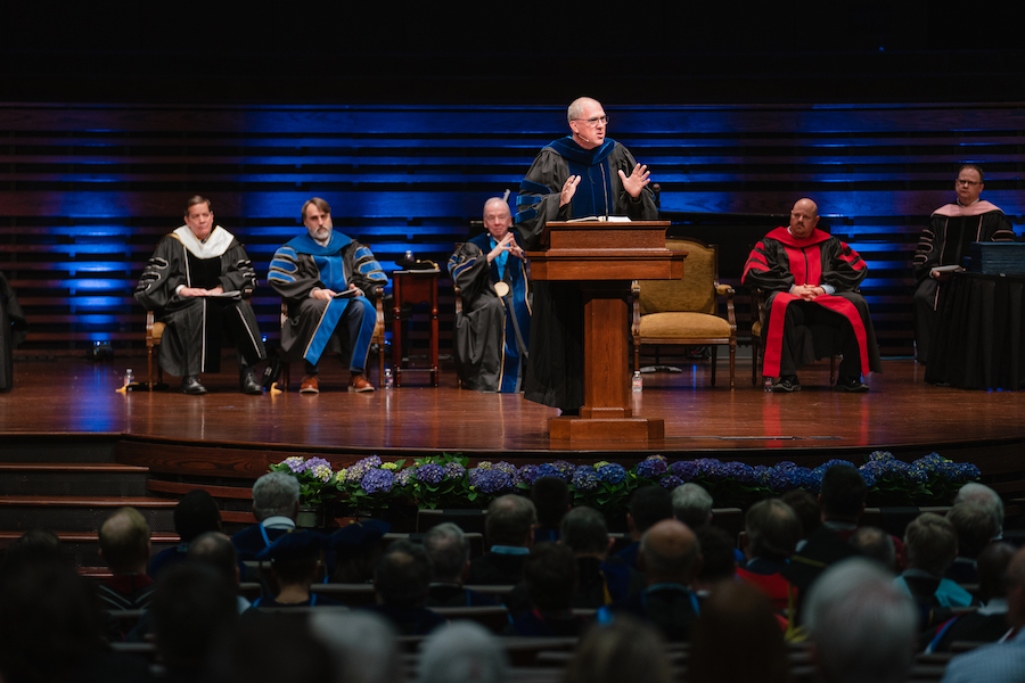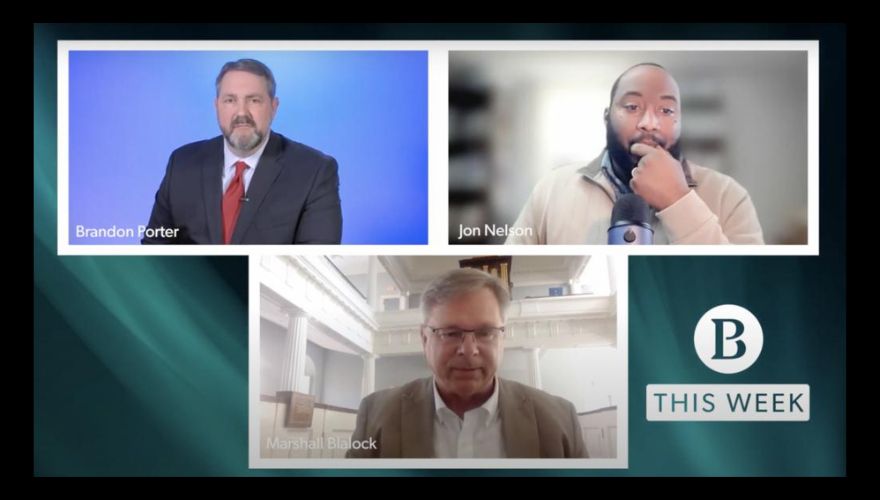
SBC President Bart Barber addresses graduates of Southwestern Baptist Theological Seminary May 3.
FORT WORTH, Texas (BP) — Get to work in the harvest, Southern Baptist Convention (SBC) President Bart Barber challenged the 301 graduates of Southwestern Baptist Theological Seminary (SWBTS) and Texas Baptist College during spring commencement held May 3 on the Fort Worth campus.
The spring 2024 graduating class included students representing 27 states of the United States and 22 countries. Seventy-seven of the 301 certificates and diplomas awarded were for non-English degrees and certificates.
“This class represents the student body at Southwestern, which is now a multinational, multiethnic, intercultural, intergenerational community,” said SWBTS President David S. Dockery, noting the names listed in the commencement program that were representative of “every region of the country and multiple nations around the world, and we celebrate God’s goodness in bringing them here.”
Framing his commencement address around Jesus’ exchange with the disciples following His encounter with the woman at the well in Samaria in John 4, Barber, who has pastored First Baptist Church of Farmersville, Texas, since 1999, noted the disciples encouraged Jesus to eat. Jesus refused and told the disciples that His food was to do the will of His Father, which was to sow and reap for the harvest of the kingdom of God, Barber explained.
Barber, himself a two-time graduate of Southwestern Seminary, reminded the graduating class that the education and training they received at the seminary is an “investment” by the students themselves and the churches of the Southern Baptist Convention that is to be put “to work in the harvest.”
“Unlike some educational institutions, we have not led you to knowledge merely for knowledge’s sake, in and of itself,” Barber said. “But instead, there is great need in the world for the gospel of Jesus Christ, and we launch you into that world in order to accomplish the purpose for which God has raised you up.”
First, Barber noted, the new graduates’ studies should give a “hunger for the harvest.”
“A seminary education is supposed to light a flame in your heart,” Barber said. “It is supposed to give you a vision and a passion in addition to giving you technique and information and know-how about how to pursue it.” He added a seminary education should “light” a “vision for the evangelization of the world, for the rescuing of souls from the domain of darkness and bringing them into the light of God.”
Barber said the disciples wondered why Jesus was not hungry when “Jesus in effect turned to them and said, ‘I’m wondering why you’re not hungry. I’m wondering why you’re able to walk by these people who are in need of the truth — in need of the gospel — and all you care about is food.’”
“I beseech you,” Barber pleaded, “to kindle in your heart a hunger for the harvest for the cause of the gospel.”
Second, Barber said, the graduates needed to have a “perception of the opportunities to harvest that are around” them. He observed that Jesus was “training” the disciples, but He also told the disciples “the harvest is ready now” as “the fields are white unto harvest.”
Third, Barber encouraged the graduates to have “an optimism about the harvest.”
“There is joy found in the ministry that you will pursue as you go from this place and there is opportunity that is there,” Barber said, while noting the graduates leave Seminary Hill “into a season of time that some have called the ‘great de-churching.’”
“You have heard it said that the opportunities are few. And you have heard it said that people are running away. And you have heard it said that your prospects are going to be difficult serving in ministry,” Barber observed before reminding the graduates that church history records “seasons of decreased interest in the gospel” that are “usually followed by seasons of spiritual awakening.” He said that “we’re seeing something like that happening.”
Barber noted that “a godless culture has not served well the people who are coming into adulthood today.” He noted that teenagers have “been deprived of human nurture and spiritual encouragement and instead have been handed a screen and find that their calendars are full and their souls are empty.
“They have a great need for the gospel,” Barber said.
He added that “people say” the churches of the SBC are “shrinking and waning,” but, he said, “that is not true.” Barber said the last published statistics show “an increase in baptisms” in the SBC and he predicts “that is a trend that will continue to grow in the days to come.”
“If you will be faithful to plant the seed, God will be faithful to bring forth the harvest,” Barber said.
Barber concluded his remarks by encouraging the graduates to “be optimistic about what Jesus can do through your ministry — about what Jesus can make of your faithfulness.
“You are among the best trained Christians in the world on this day,” Barber concluded. “May you also be among the most zealous Christians in the world going forth from this day and may God make much of your labor in Him.”
Barber’s sister, Traci Barber Smith, was one of the graduates, having earned a Master of Theological Studies from the seminary’s School of Theology.
The ceremony also included the awarding of the David S. and Lanese Dockery Faculty Award for Teaching Excellence to Joshua Williams, associate professor of Old Testament and director of the seminary’s Research Doctoral Studies program. Williams, who has served at Southwestern since 2006, was nominated for the award by his faculty colleagues based on the award’s criteria of faithful and effective teaching of students and genuine care and concern for the spiritual development of students inside and outside of the classroom.
In his opening remarks during the ceremony, Dockery told the gathering that the fathers of both Southwestern’s ninth president, Adam W. Greenway, and Jamie Dew, president of New Orleans Baptist Theological Seminary, had died the day before, and he then led the congregation in a time of prayer for the families.


